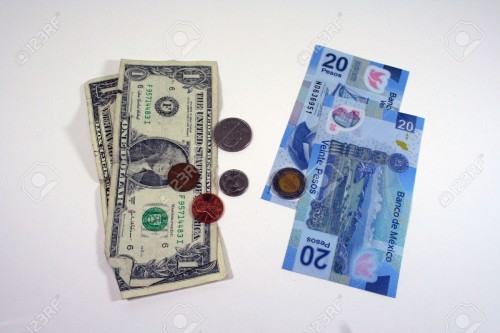The battered Mexican peso has tumbled to historic new lows in recent days, hovering near a psychological barrier of 20 pesos to the U.S. dollar and causing anxiety on the streets, at businesses and in the halls of government.
Among other factors, many point to the recent rise in U.S. presidential polls of Donald Trump, the Republican nominee who has vowed to build a wall along the U.S.-Mexico border and has been widely accused here of Mexico-bashing, the Los Angeles Times reports.
“There is a very clear relation with the [U.S.] electoral process,” Mexican President Enrique Peña Nieto told Radio Formula last week, linking Trump’s improved standings in the polls to the peso’s doldrums.
The Mexican currency plunged to a record low of about 19.90 to the dollar last week and has hovered near 20 to the dollar for days. Exchange houses are already posting signs offering a 20-peso exchange rate, a jarring sight for many here.
Despite official declarations downplaying the devaluation, some analysts are warning that things could get worse and assailing what they call government inaction.
“It appears that the authorities in charge of the politics, economics and finances of the country are flummoxed, paralyzed by the magnitude of the devaluation,” wrote columnist Enrique Galvan Ochoa in Mexico’s La Jornada newspaper. “And the effects of the phenomenon could extend to the large companies of the private sector, deeply indebted in dollars.”
Peña Nieto, already facing record-low approval ratings, lamented that many Mexicans view a falling peso as “synonymous with a crisis.”
But the president told Radio Formula, “This cannot be associated with an economic crisis.”
He blamed external factors for the current “volatility,” singling out the “enormous uncertainty” of the upcoming U.S. presidential elections and polls showing Trump gaining ground.
Economists cite a number of other causes, including the drop in oil prices since mid-2014, Mexico’s generally sluggish growth and predictions of a U.S. interest rate hike.
Whatever the reasons, the plummeting peso has generated considerable concern. As the president noted, many here inevitably link a decline in the currency’s value in relation to the dollar as an indicator of economic distress — even an impending economic meltdown.
The peso has dropped almost 14% in value against the dollar this year and nearly 50% since September 2014.
“This is worrying because in Mexico, history and experience tell us that very strong economic crises follow when the peso weakens against the dollar,” said Pedro Mendez, 63, a retiree. “Of course the government says not to be concerned. But they rob with open hands!”
“Prices have been rising for months,” said Rosa Maria Tellez, a nurse and mother of three. “Now you go to the supermarket and pay double, or leave with half the products you could have bought a year ago. This business with the dollar will only make it worse. … Everyone raises their prices and says it’s because the dollar increased in value.”
Alberta Torres, 56, who sells food from a street stand, says customers are purchasing less these days, complaining that their salaries are not sufficient.
“The economic situation is worse every day. We don’t have enough money in our pockets,” said Torres. “One has to go in debt and borrow to finish off the month.”
But not everyone here is bemoaning the peso’s decline.
For the multitudes of Mexicans who depend on remittances — dollars sent home by expatriate Mexican citizens residing in the United States and elsewhere — the devaluation has represented something of a windfall. The stronger dollar means they receive more pesos for every buck sent home.
“In the last few months since the dollar increased in value, we are doing a lot better,” said Maria Rosa Beltran, 45, who spoke in front of a Mexico City Western Union outlet, destination of many who regularly collect money wired from the U.S.
Her husband and son are field workers in North Carolina, Beltran explained, and each month they send between $800 and $1,000 to her in Mexico. Some of the extra cash is going into building a new house for her son.
“We are receiving more money in pesos, and I’m very happy,” said Beltran. “My son wants to come back to Mexico and marry and have his children here.”
Also pleased with the higher payout is Georgina Torres, 44, a domestic worker and mother of three whose husband sends about $600 home each month from a job waiting tables in California.
“Now with the extra money I can buy my kids clothes, sneakers, school uniforms — things that I couldn’t purchase for them normally,” said Torres, who also spoke outside the Western Union outlet.
“But we also have to save: We don’t know if this is going to continue or not. My husband says if Trump wins, things will likely get more difficult, and he may have to come back here.”
Source: latimes.com



